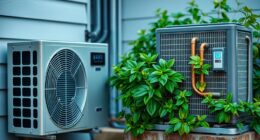Are heat pumps really living up to their potential in the renewable energy sector?
We delve into this pressing question, evaluating their efficiency, considering the challenges and opportunities they present, and exploring their role in meeting renewable energy goals.
Join us as we analyze the benefits of integrating heat pumps into renewable energy systems and strive to maximize their impact.
Get ready to uncover the truth behind heat pumps’ role in the world of renewable energy.

Key Takeaways
- Heat pumps have significant potential in renewable energy systems and play a crucial role in decarbonizing heating.
- Heat pumps are more energy-efficient than traditional heating systems, with their efficiency measured by the coefficient of performance (COP).
- Variability in renewable energy sources and high upfront costs of installation pose challenges for heat pumps, but technological advancements and integration with energy storage solutions present opportunities.
- Heat pumps contribute to reducing greenhouse gas emissions, provide heating, cooling, and hot water in an efficient manner, and play a significant role in achieving sustainability targets.
The Potential of Heat Pumps in Renewable Energy Systems
We believe heat pumps have significant potential in renewable energy systems. Heat pump technology plays a crucial role in decarbonizing heating, making it a key component of sustainable energy solutions.
Heat pumps are highly efficient devices that can extract and transfer heat from one place to another, utilizing renewable energy sources such as the air, ground, or water. By utilizing these renewable energy sources, heat pumps can provide both heating and cooling, offering a versatile solution for various applications.
The ability of heat pumps to transfer heat rather than generate it makes them more energy-efficient than traditional heating systems. This efficiency not only reduces carbon emissions but also results in long-term cost savings for consumers.
With advancements in technology and increasing focus on decarbonization, heat pumps are poised to play a prominent role in renewable energy systems.
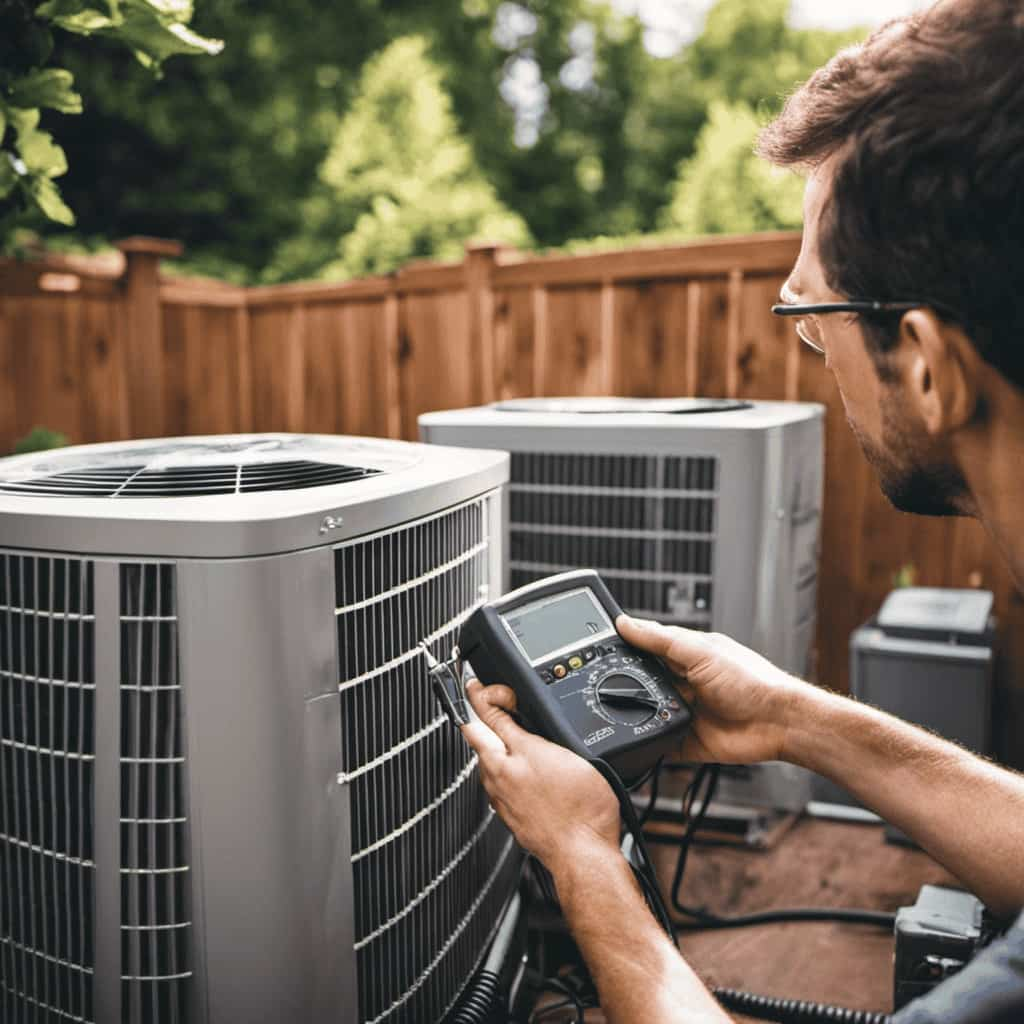
Evaluating the Efficiency of Heat Pumps in Renewable Energy Solutions
When evaluating the efficiency of heat pumps in renewable energy solutions, it’s important to consider their ability to effectively utilize and transfer heat from renewable energy sources. Heat pump efficiency plays a crucial role in maximizing the energy output derived from renewable sources such as solar, geothermal, and air.
The efficiency of heat pumps is commonly measured by their coefficient of performance (COP), which represents the ratio of heat output to the electrical energy input. A higher COP indicates a more efficient heat pump system. Achieving high heat pump efficiency is essential for successful renewable energy integration, as it ensures that the maximum amount of heat is extracted from the renewable energy sources and delivered to the desired space or water heating applications.
Understanding heat pump efficiency is vital for designing effective renewable energy systems that can contribute to reducing greenhouse gas emissions and achieving energy sustainability.
Transitioning into the subsequent section about challenges and opportunities for heat pumps in renewable energy applications, we’ll explore the factors that can impact the efficiency of heat pumps and discuss potential strategies to optimize their performance.

Challenges and Opportunities for Heat Pumps in Renewable Energy Applications
One of the main challenges for heat pumps in renewable energy applications is the variability in renewable energy sources. Heat pump technology relies on a consistent and reliable source of renewable energy to operate efficiently. However, renewable energy sources such as solar and wind power are inherently intermittent, which can impact the performance and reliability of heat pumps. This variability in energy availability can lead to fluctuations in heat pump operation, affecting its efficiency and effectiveness.
To better understand the challenges and opportunities for heat pumps in renewable energy applications, let’s take a look at the following table:
| Challenges | Opportunities |
|---|---|
| Variability in renewable energy sources | Technological advancements in heat pump systems |
| Limited availability of renewable energy | Integration with energy storage solutions |
| High upfront costs of heat pump installation | Increasing market growth and economies of scale |
As the market for renewable energy continues to grow, there are opportunities for advancements in heat pump technology and integration with energy storage solutions. This can help address the challenges posed by the variability and limited availability of renewable energy sources. Additionally, increasing market growth and economies of scale can lead to cost reductions, making heat pumps a more viable option for meeting renewable energy goals.
In the next section, we will explore the role of heat pumps in meeting renewable energy goals and how they can contribute to a more sustainable future.
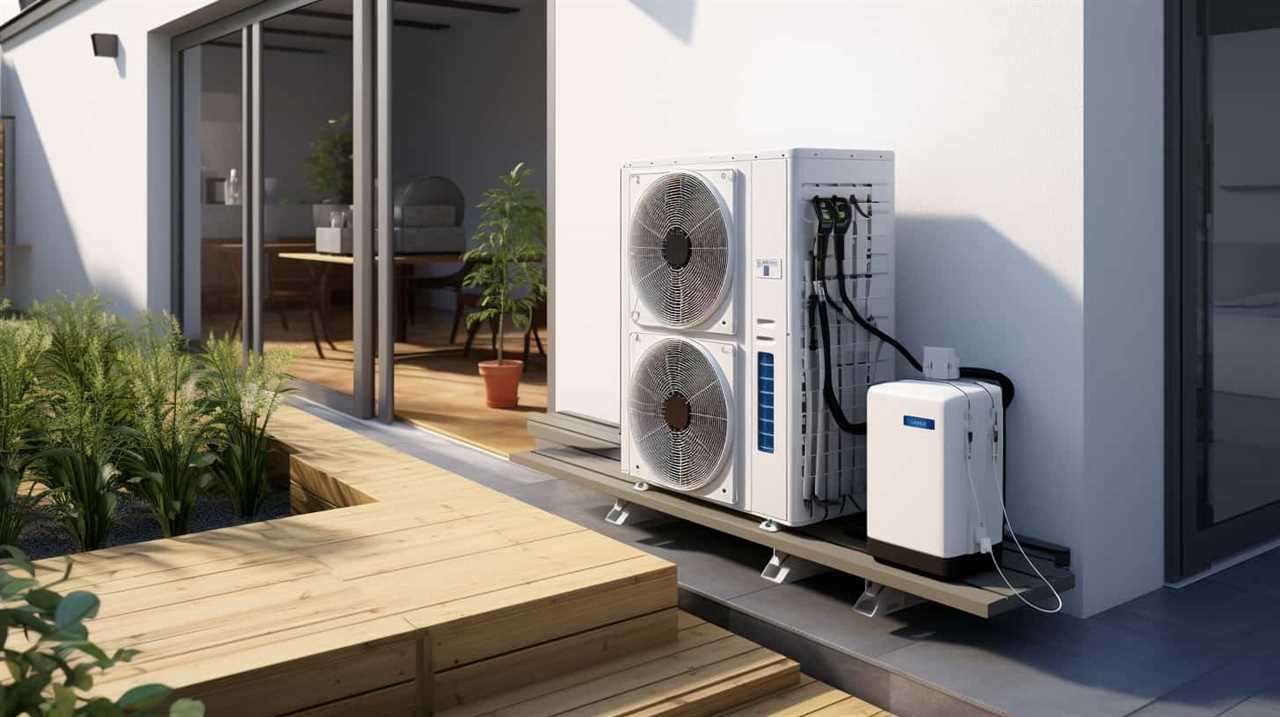
Exploring the Role of Heat Pumps in Meeting Renewable Energy Goals
To understand the role of heat pumps in meeting renewable energy goals, we must examine their potential and limitations.
Heat pumps have gained attention as a promising technology for reducing greenhouse gas emissions and achieving sustainability targets. They work by transferring heat from a lower temperature source to a higher temperature sink, using a small amount of input energy. This process allows heat pumps to provide heating, cooling, and hot water in an efficient manner.
However, it’s important to consider the environmental impact of heat pumps, particularly in terms of refrigerants used and their potential for leakage. Future advancements in heat pump technology are focusing on reducing these environmental concerns, such as developing more environmentally friendly refrigerants and improving system efficiency.
Maximizing the Benefits of Heat Pumps in Renewable Energy Integration
We can maximize the benefits of heat pumps in renewable energy integration by strategically integrating them into our energy systems. Heat pump technology has the potential to play a significant role in achieving our renewable energy goals.

Here are two ways we can maximize the benefits of heat pumps:
Optimizing System Design
Incorporating heat pumps into the design of renewable energy systems can enhance their overall performance and efficiency.
By strategically placing heat pumps within the energy system, we can capitalize on their ability to extract and transfer heat from various sources, such as air, water, or the ground.

Demand Response Integration
Integrating heat pumps with demand response programs can further optimize their operation and increase their contribution to renewable energy integration.
By intelligently controlling the operation of heat pumps based on the availability of renewable energy resources, we can ensure that they’re used when there’s excess renewable energy generation, thus reducing the need for fossil fuel-based backup systems.
Frequently Asked Questions
How Do Heat Pumps Contribute to Reducing Greenhouse Gas Emissions in Renewable Energy Systems?
Heat pump technology plays a vital role in reducing greenhouse gas emissions in renewable energy systems. By utilizing heat pump efficiency, we can maximize the extraction and utilization of heat from renewable sources, resulting in a more sustainable and environmentally friendly energy solution.
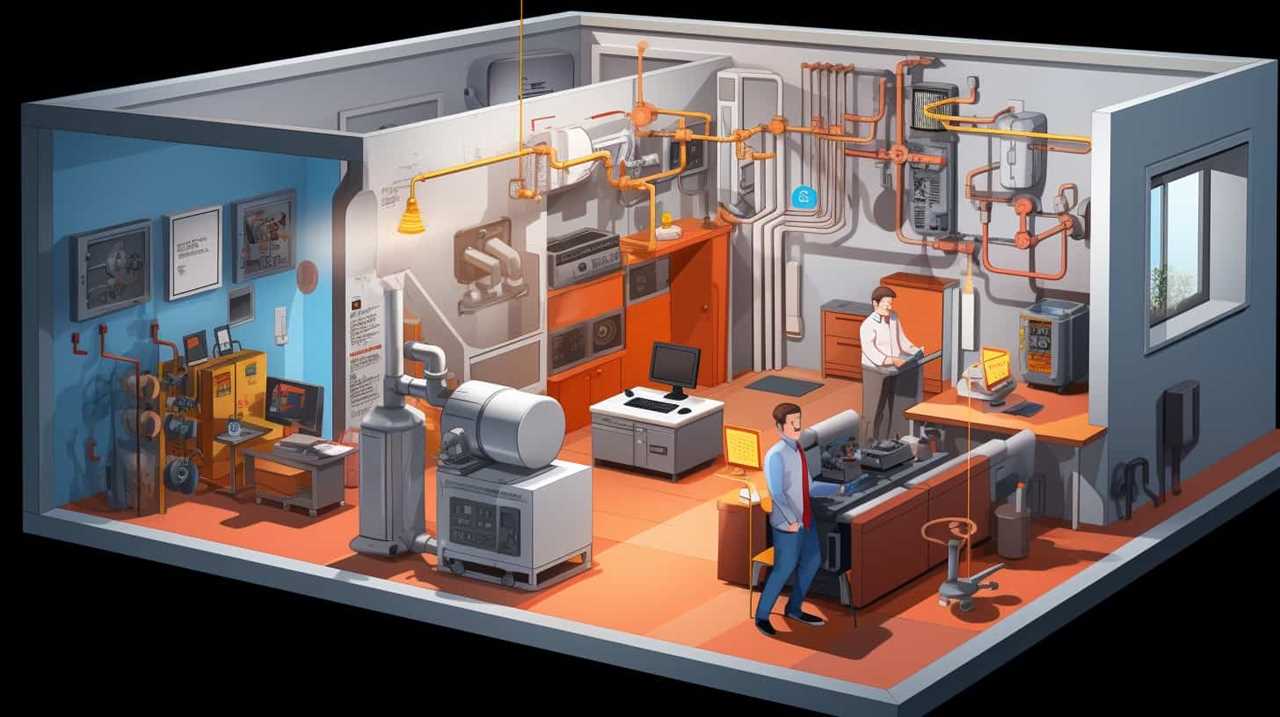
What Are the Main Factors to Consider When Evaluating the Efficiency of Heat Pumps in Renewable Energy Solutions?
When evaluating the efficiency of heat pumps in renewable energy solutions, efficiency evaluation and cost analysis are key factors to consider. It’s like dissecting a machine, analyzing its components and performance to determine its worth.
What Are the Major Challenges Faced by Heat Pumps in Renewable Energy Applications, and How Can They Be Overcome?
Overcoming challenges and enhancing performance are critical in heat pumps’ role in renewable energy. We must address the major obstacles faced by heat pumps and find innovative solutions to ensure their efficient operation in renewable energy applications.
How Can Heat Pumps Play a Significant Role in Meeting Renewable Energy Goals?
Heat pumps can play a significant role in meeting renewable energy goals by decarbonizing heating systems and optimizing their performance. Their efficient technology and ability to utilize renewable energy sources make them a valuable tool in achieving sustainability.
What Are Some Strategies to Maximize the Benefits of Heat Pumps in Integrating Renewable Energy Sources?
To maximize the benefits of heat pumps in integrating renewable energy sources, we can explore strategies such as smart grid integration and policy incentives. These approaches can help optimize heat pump performance and enhance overall energy efficiency.
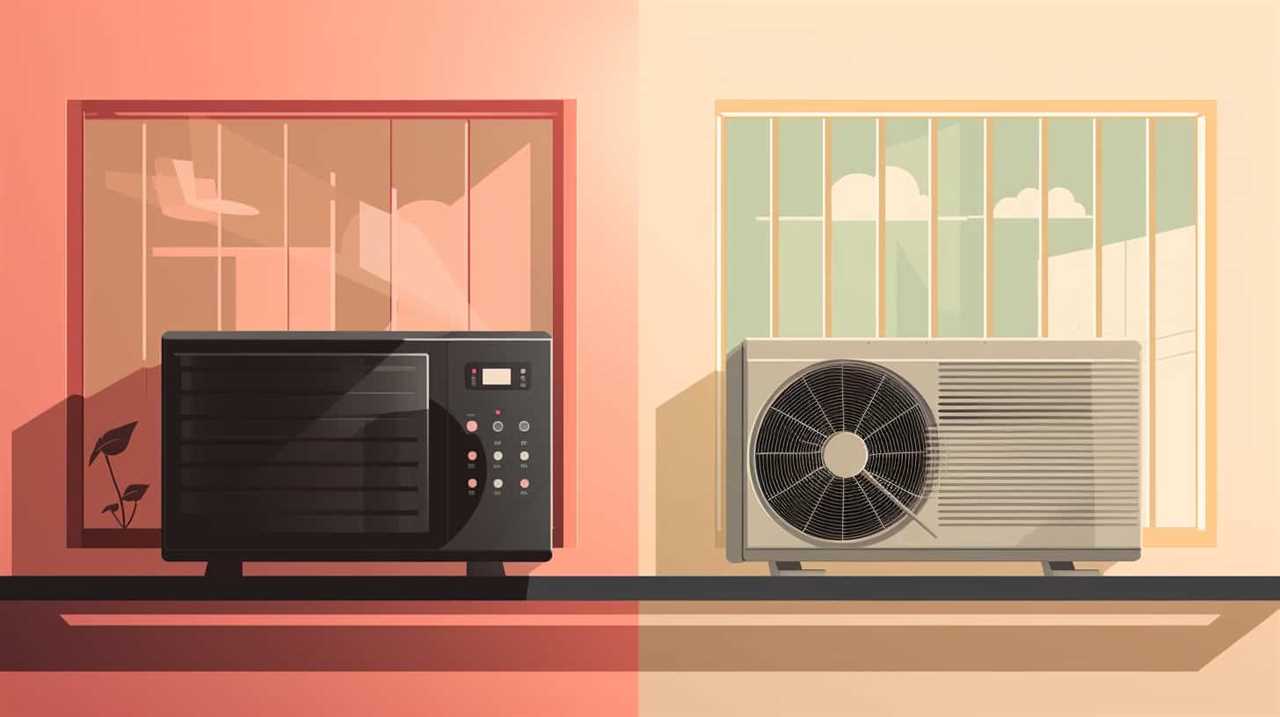
Is Heat Pump Technology a Reliable and Sustainable Option for Heating?
Heat Pump technology provides a reliable and sustainable option for heating. With its ability to extract heat from the air or ground, sustainable heat pump technology can provide efficient heating even in colder climates. By utilizing renewable energy sources, such as electricity, heat pumps reduce carbon emissions and dependence on fossil fuels. This eco-friendly solution offers long-term reliability and energy savings for heating homes and buildings.
Conclusion
In conclusion, heat pumps have the potential to play a significant role in the realm of renewable energy. Their efficiency and ability to integrate into existing systems make them a valuable asset in meeting renewable energy goals.
However, challenges and opportunities must be carefully evaluated to maximize their benefits. Like a well-oiled machine, heat pumps can seamlessly contribute to the renewable energy landscape, paving the way for a more sustainable future.







